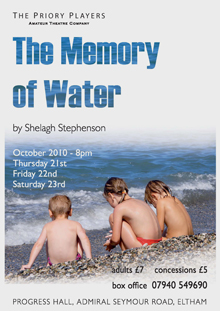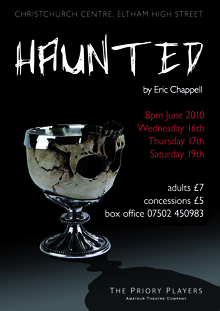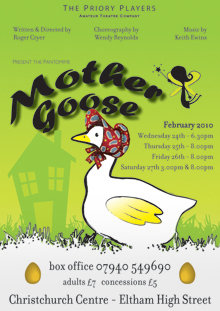2010 productions
21–23 October 2010
The Memory of Water
By Shelagh Stephenson
Three sisters; Teresa, Mary and Catherine, meet at the old family home before their mother's funeral, each haunted by their own demons. The play focuses more on how each sister deals with the death and how it directly affects them. The three each have different memories of the same events, causing constant bickering about whose memories are true. As the three women get together, all their lies and self-betrayals are about to reach the surface.
The sisters' memories interact with each other, and show that despite synchronicites of time and place they cannot agree upon one unifying experience. This is echoed in Vi's final speech, which portrays Alzheimer's disease as being adrift among a series of islands of your own identity. The sisters drift around their own islands of memory, unable to agree on one particular point, and yet are unified by their familial bond.
16–19 June 2010
Haunted
By Eric Chappell
Nigel Burke is a reclusive neurotic and agoraphobic playwright who after a bad review contracts writers block and will only see his wife Mary and agent Turner. His life is turned upside down when two people enter his enclosed world, the vivacious novelist Julia and the strange Mr Potter.
Potter offers Nigel the skull goblet once owned by Lord Byron, Nigel's lifelong hero. After drinking from it, the ghost of Byron appears to him and offers advice about how to live life to the full, but when you consider that Byron's life was one of debauchery and recklessness, this advice could be considered a little suspect!
Nigel learns from the deceased poet, embarks on a passionate affair with Julia (and any other nearby women) until, finally, he and Potter decide to leave all the recent upheaval behind and set off on a road trip to Italy.
24–27 February 2010
Mother Goose
By Roger Cryer
Old Mother Goose is to be thrown off her land because she cannot pay the Squire and his Bailiffs the rent. Knowing that Mother Goose is a kind soul the good fairy sends her a gift in the shape of Priscilla, the golden egg laying goose. Mother Goose loves her as a friend and welcomes Priscilla into her family, for the first time in her life Mother Goose is rich. Along comes the Demoness who has a bet with the fairy. She claims there is no-one on earth who is happy with what they have got, they always want more. The fairy disagrees, and uses Mother Goose as an example of goodness.
The Demoness tempts Mother Goose with the one thing she doesn’t have – youth and beauty. She persuades Mother Goose to give up Priscilla in exchange for a visit to the “Pool of Beauty”. She hands Priscilla over, and enters the pool, emerging as (she thinks) a beautiful woman.
All her friends don’t like her now – they want the old Mother Goose back. Too late she realises that beauty is NOT everything, and that she must get Priscilla back. Finally she goes to the “Goose Court” in Gooseland to plead for Priscilla, she gets her back, and all ends happily ever after.



